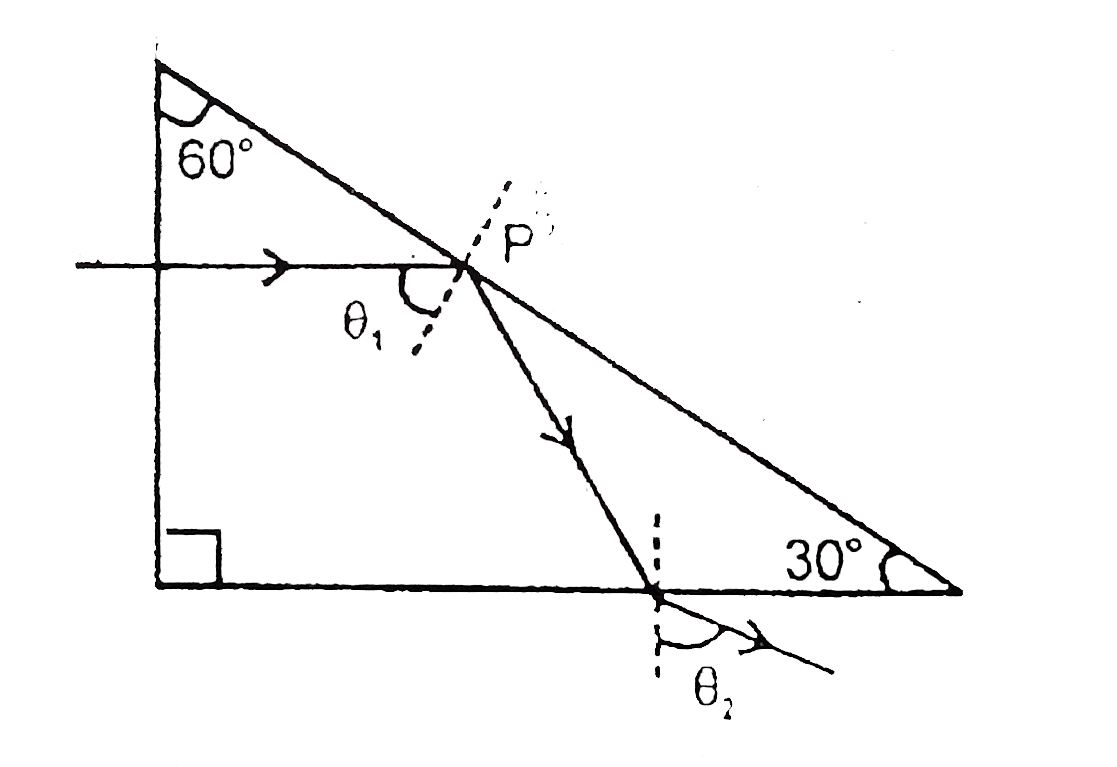When a ray of light is incident normally on one refracting surface of an equilateral prism (Refractive index of the material of the prism
emerging ray is deviated by
emerging ray is deviated by
emerging ray just grazes the second refracting surface
the ray undergoes total internal reflection at the second refracting surface
The correct Answer is:D
(d) Here,
Therefore,
Topper's Solved these Questions
- BOOK - DC PANDEYCHAPTER - RAY OPTICSEXERCISE - medical entrance special format question25videos
RAY OPTICS
- BOOK - DC PANDEYCHAPTER - RAY OPTICSEXERCISE - Medical entrance gallary76videos
RAY OPTICS
- BOOK - DC PANDEYCHAPTER - RAY OPTICSEXERCISE - Checkpoint 9.710videos
RAY OPTICS
- BOOK - DC PANDEYCHAPTER - NUCLEIEXERCISE - C MADICAL ENTRANCES GALLERY46videos
NUCLEI
- BOOK - DC PANDEYCHAPTER - REFLECTION OF LIGHTEXERCISE - Subjective9videos
REFLECTION OF LIGHT
Similar Questions
A ray of light is incident normally on one of the refracting surfaces of a prism of refracting angle A,. The emergent ray grazes the other refracting surface. Find the refractive index of the material ofprism.
View SolutionA monochromatic ray of light is incident at an angle of 50∘ on one of the refracting surfaces of an equilateral prism . What is the refractive index of the material of the prism , if the angle of emergence is also 50∘ ?
[ sin 50∘=0.767]View Solution
Knowledge Check
- Question 1 - Select One
When a ray of light is incident normally on one refracting surface of an equilateral prism of refractive index 1.5, then
Athe ray undergoes total internal reflection at the second refracting surface of prismBemergent ray is deviated by 30∘Cemergent ray is deviated by 60∘Demergent ray just grazes the second refracting surface of the prism - Question 2 - Select One or More

A ray of light is incident normally on one face of a prism as shown in figure. The refractive index of the material of the prism is 53 and the prism is immersed in water of refractive index 43, thenAThe angle of emergence θ2 of the ray is sin−2(58)BThe angle of emergence θ2 of the ray is sin−1(54√3)CThe angle of emerrgence θ2 of the ray is sin−1(73√4)DTotal internal reflection will not occur at P if the refractive index of water increases to a value greater than 52√3 by dissolving some substance. - Question 3 - Select One
A ray of light is incident normally on one face of an equilateral prism of refractive index 1.5. The angle of deviation is: (Given sin−1.23=42∘)
A30∘B45∘C60∘D75∘
If the angle of minimum deviation is of 60∘ for an equilateral prism , then the refractive index of the material of the prism is
View SolutionA monochromatic ray of light is incident normally on one of the refracting surfaces of a prism . The emergent ray grazes the second refracting surface . What is the angle of the prism if the refractive index of the material of the prism is 1.6 ?
View SolutionA ray of light incident at 49∘ on the face of an equilateral prism passes symmetrically. Calculate the refractive index of the material of the prism.
View SolutionA ray of light is incident normally on one of the refracting surfaces of a prism of refracting angle A,. The emergent ray grazes the other refracting surface. Find the refractive index of the material ofprism.
View SolutionA ray of light is incident normally on one of the equal faces of a right isosceles prism of refractive index 1.5. The angle between incident and emergent rays is
View Solution

